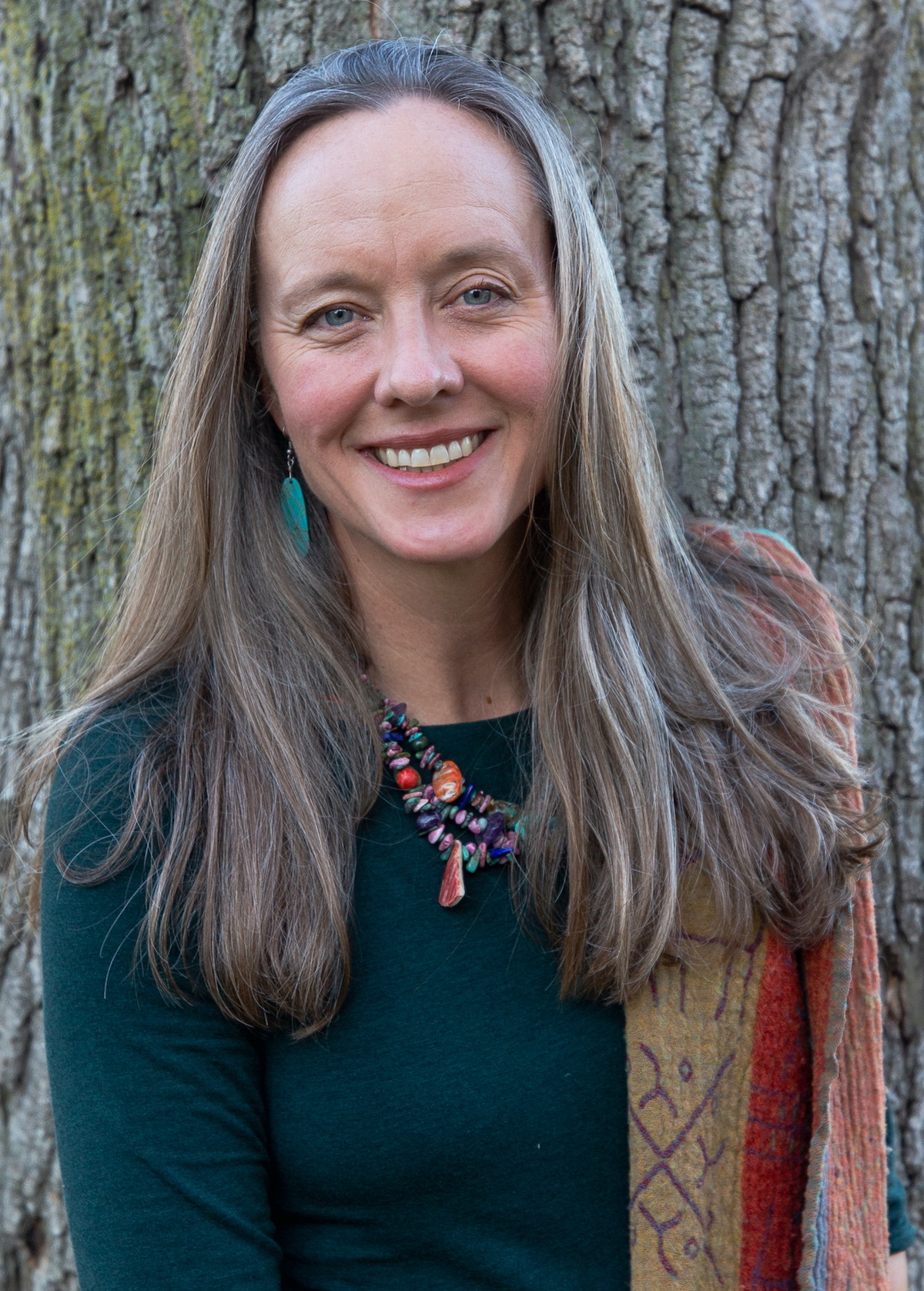A 20-year love affair with the written word
An interview with poet Pamela Uschuk about Cutthroat: A Journal of the Arts and its 20th anniversary
An interview with poet Pamela Uschuk about Cutthroat: A Journal of the Arts and its 20th anniversary
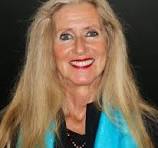
Pamela Uschuk
Pamela Uschuk is an American poet with roots in southern Michigan, who found a new querencia in Tucson, Arizona, within the Chihuahuan desert, and calls a centennial farmstead in Bayfield, Colorado, home. Uschuk won an American Book Award in 2010 for her collection, Crazy Love: New Poems. Her 2015 collection Blood Flower: New Poems released by Word Wings Press will be reprinted by Red Hen Press in 2025. Altogether, she is the author of seven books of poetry; her latest, Refugee (2022), gives voice to the flux and flow of immigration, migration and exile throughout the world. She is a champion of all who seek refuge and a place to call home.
Uschuk’s life and creative partner is poet William Pitt Root. Together they are the directors and editors of Cutthroat: A Journal of the Arts which is celebrating its 20th Anniversary and 29th issue this spring, titled “Taking Liberties.”
Shelli Rottschafer: Pam, thank you so much for this interview and the chance to talk more about Cutthroat.
Pamela Uschuk: Sincerest thanks to Rocky Mountain Reader for this interview and for supporting independent grassroots journals like Cutthroat!
SR: I mention the 20-year love affair that you and Bill have had with Cutthroat. Can you tell us more about this journey? What was the spark that became the journal?
PU: The spark ignited at our kitchen table in Durango, Colorado, in summer of 2005. My memory is that I said to Bill, “I think we should start a literary magazine. It’s time to give back.” Bill had just taken early retirement from teaching at Hunter College 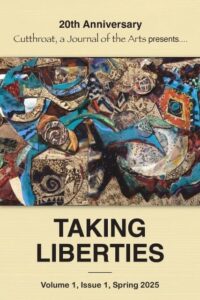 in Manhattan. After a year’s difficult commute to Durango from North Carolina where I directed The Center for Women Writers and was an Associate Professor of Creative Writing at Salem College, I quit my job and moved back West. That is when we began the groundwork for the journal.
in Manhattan. After a year’s difficult commute to Durango from North Carolina where I directed The Center for Women Writers and was an Associate Professor of Creative Writing at Salem College, I quit my job and moved back West. That is when we began the groundwork for the journal.
SR: How did the journal become named Cutthroat?
PU: Bill and I agree that the name Cutthroat was generated by both of us. I wanted it named after Colorado’s endangered species, the Greenback Cutthroat Trout; Bill had in mind also the political connotation, addressing cutthroats of all kinds.
SR: Cutthroat highlights all forms of creativity. It includes both visual and written work. How do poems, short stories, creative nonfiction essays and artwork converse together within these pages?
PU: Our desire is to keep Cutthroat’s mission of creating a literary community of fine writing of all kinds across multiple genres. More and more our thrust has been to bring together a diversity of writers reflecting the multicultural/multiracial/multigender/multi-abled nature of our nation and its history to address important issues—environmental, social, human rights, free speach, land use, preservation and nourishing of the wild, immigration, war, the rhetoric of hate and fear and of the language of love and healing—facing our nation and the world. I like to think of every issue/every anthology as its own community of writers and their writings in conversation. We don’t intend to answer questions, but we do intend to keep asking essential questions.
As MacAurthur Fellow J. Drew Lanham said of Cutthroat, “Cutthroat walks the walk, practices real diversity, doesn’t just pay lip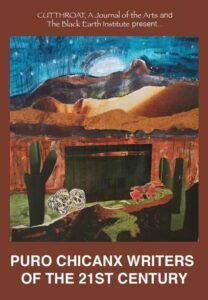 service to it.” The diversity of our editors reflects the diversity of our writers and of our audience.
service to it.” The diversity of our editors reflects the diversity of our writers and of our audience.
SR: Each Cutthroat issue has a specific theme. In 2025 the theme is “Taking Liberties.” What does this mean to the editors of this issue?
PU: As you’ve probably guessed, “Taking Liberties” has more than one connotation. One meaning alludes to writers taking liberties with language, and the interweaving of form, such as Octavio Quintanilla’s Frontextos which mix visual art with poetry. “ Taking Liberties” can also refer to writing that addresses liberties or constitutional freedoms in danger of being lost, such as freedom of speech or freedom of peaceful assembly or the Civil Rights Act, women’s rights, including a woman’s right to vote and have sovereignty over her own body, etc.
SR: What have past themes of previous issues been? Which is one you are especially proud of?
PU: We have published several special-topic issues. To provide some examples, in 2020 we published “Puro Chicanx Writers of the 21st Century.” It highlighted Chicana icons such as Ana Castillo, Sandra Cisneros and Carmen Tafolla as well as Young Adult author Matt Mendez, and multi-genre author Luis Alberto Urrea. In 2022 we published “Through the Ash, New Leaves: Writers Respond to the Climate Crisis” with poets Joy Harjo, Namoi Shihab Nye and B.J. Buckley, and nonfiction authors J. Drew Lanham and Lidia Yuknavich amongst many others.
However, each issue of Cutthroat is unique, spotlighting something essential. Since 2018, we have featured guest poetry and fiction editors, including Teresa Mei Chuc, Richard Jackson, Darlin’ Neal, Leslie Contreras Schwartz, Edward Vidaurre, Patricia Jabbeh Wesley, to name a few.
I am proud of all of the special issues for different reasons. But now, I am most proud of this new issue, “Taking Liberties,”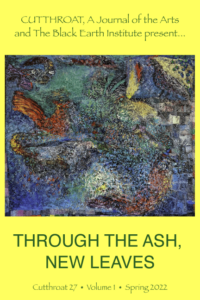 which contains 416 pages featuring 112 writers.
which contains 416 pages featuring 112 writers.
SR: One unique aspect of Cutthroat is that it highlights both established and emerging authors. In the current issue, “Taking Liberties,” who are some of these emerging voices that Rocky Mountain Readers should pay attention to?
PU: An emerging poet is Paul Catafago. He is a Palestinian-Lebanese writer and cultural organizer based in New Orleans. Nonfiction author Mary Beth Rew Hicks is a marine biologist on the Oregon coast and writes as an environmental advocate. Then there is Taiwanese-American poet, Pei-Ying Olson. She is a middle school student! We are proud to feature these emerging or first publication writers.
SR: During Cutthroat’s 20-year existence, you have worked with many authors. Is there a particular voice you feel should garner more attention? Who would you recommend to read?
PU: Over 20 years is a long time and a lot of writers. I don’t know if I can tamp it down. Yet, one of our editors, Jesse Tsinijinnie Maloney, teaches at Dineh College in Tuba City, Arizona. His collection of poetry is Health Carefully (2019). Jesse is a fine writer who deserves a larger audience. Another is Polish poet Lucyna Prostko. She is a feminist eco-poet; her collection is Infinite Beginnings (2009). However, there are many others who come to mind. Each are incredible writers who should be read and acknowledged much more widely.
SR: One thread within “Taking Liberties” concerns human rights and immigration, or one’’s status as exile or refugee. This is also in conversation with your latest collection of poems, Refugee. Can you tell us more?
PU: All of my life I’ve been an activist for environmental justice, for wilderness and wildlife and our beloved planet. These are root systems entangled like fungi underground with my passionate activism for human rights, women’s rights and immigrant/refugee rights. I grew up in an immigrant family that was often persecuted for being of Russian/Belarussian/Siberian/Mongolian origins, but that is a long story.
Human rights and immigrant rights are in even greater peril now. This has always made no sense to me, since every citizen in our nation, except for Indigenous peoples, is an immigrant. This country was founded by immigrants, some of whom had refugee roots, and they wrote our Declaration of Independence as well as our Constitution. Now, those in power are actively anti-immigrant! I believe there is a lot of self-hatred in this kind of scapegoating and vilification of immigrants/refugees.
SR: What are you personally working on right now? If you were to incorporate that into a workshop or writing prompt, what would you spark your students/readers/audience to do?
PU: I am always writing new poems. Yet at the moment I am refining my memoir-in-progress, Crazed Angels of Hope: An Odyssey Through the Whispering Disease. For 12 years now, I’ve been a survivor of Stage Three Ovarian Cancer.
One of my oncologists at the Mayo Clinic called me the “poster girl for ovarian cancer survival,” but this disease (and, I mean that as dis-ease) has greatly humbled and changed my life. I’ve worked on and off on this multi-genre memoir since I finished the course of brutal chemotherapy I received at the Mayo Clinic. This memoir tells my journey, including chapters on the many healers who came together to help me, including other chapters on enlightenments, reversals, being brought to my knees physically, emotionally and spiritually, and including my long climb back to good health.
This is not simply my story, but the story of so many women in this country, women whose intuitions or knowing of their own bodies have been discounted and ignored and of women who have not survived as well as those who have. This is an odyssey into the nature of healing. It’s time now I let this story into the world. I’ve been holding onto it. … It wasn’t ready, but it is near ready now. So, my message would be to allow your story to incubate, and then let it be in the world.
SR: To close, what would your message, or Cutthroat’s message to Rocky Mountain Readers, be?
PU: My message to readers during these political climes is: Don’t give up.
Then, for those of you are emerging writers and perhaps wish to submit work to us, we begin reading again for our next issue on August 1, 2025. The theme of Issue #30 is yet to be determined. Also it is wise before you submit, to read a copy of Cutthroat to see what kind of work we tend to publish.
And as part of a literary community, PLEASE support small presses and magazines. They publish the bulk of writers in our country.
— Copies of Cutthroat’s 20th anniversary edition, “Taking Liberties,” and back copies of previous volumes can be purchased at the magazine’s website. “Taking Liberties” will also be distributed through independent bookstores.
Shelli Rottschafer (she/her/ella) completed her doctorate from the University of New Mexico in 2005 in Latin American Contemporary Literature. From 2006 until 2023 Rottschafer taught at a small liberal arts college in Michigan. Summer 2023 she began her low-residency MFA in Creative Writing with an emphasis in Poetry at Western Colorado University, Gunnison. Together with her partner and rescue pup, she resides in Louisville, Colorado and El Prado, Nuevo México.
Click here for more from Shelli Rottschafer.
